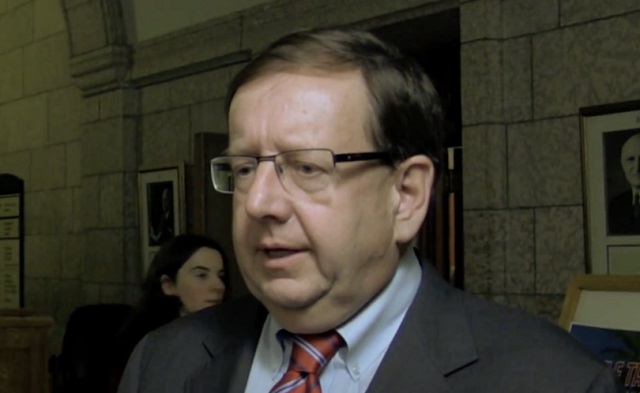National
Top Liberal says Trudeau should step down as party leader amid dismal polling

Senator Percy Downe
From LifeSiteNews
If the next Liberal Leader is able to bring the party back to the center of the political spectrum, Liberals have a chance of being reelected,’ Senator Percy Downe wrote in an op-ed earlier this week
Amid dismal polling numbers, a Liberal Party of Canada stalwart-turned-senator said the party needs to look for a new leader to replace Justin Trudeau.
The comments were made by Senator Percy Downe, who served as former Liberal Prime Minister Jean Chrétien’s chief of staff, from 2001 to 2003. Downe was appointed a senator by Chrétien in 2003.
On Wednesday, in an opinion piece for National Newswatch, Downe said that the “prudent course of action” is for another “Liberal Leader to rise from the impressive Liberal caucus and safeguard those policies [Trudeau] was actually able to accomplish.”
“If the next Liberal Leader is able to bring the party back to the center of the political spectrum, Liberals have a chance of being reelected,” he wrote.
Downe claimed that the party needs a new leader as it is the only one that has a “realistic chance of stopping a government led by Pierre Poilievre [the current Conservative leader].”
Recent polling shows that support for Poilievre’s Conservative Party is hitting positive levels not seen since the early days of former Prime Minister Stephen Harper. Indeed, a Federal @338Canada model has the “Outcome Odds” for a Conservative majority government at 95 percent.
Digging a little deeper, a recent Leger poll shows the Conservatives taking some 211 seats, a gain of 90 seats (well over the majority of 170 needed) with the Trudeau Liberals losing some 90 seats to win only 70 if an election were held today.
According to Downe, the opportunity for a Poilievre government was “created by a lack of fiscal responsibility in the Trudeau government, and the damage it caused our economy is now showing up in the opinion poll numbers.”
He also said that more centrist Liberal Party members became reluctant to support Trudeau after realizing they could not persuade him to spend less money.
“That naiveté was replaced with the realization that they were not a serious government when it came to the economy, that they simply didn’t care and would throw money at anything that crossed their mind. The resulting interest rate hikes, increasing cost of living, and huge debt didn’t seem to concern them,” he wrote.
Despite calling for Trudeau to be replaced, Downe expressed a lyrical sentiment toward the prime minister, saying “many party members are also grateful that Justin’s greatest accomplishment as leader has been his success in recruiting multitalented Canadians to serve in Parliament.”
Liberal heavyweight claims Trudeau could step down as early as February
Downe suggested, in a recent Hill Times interview, that he thinks Trudeau could step down as party leader as early as February of 2024. This was in the same month in 1984 that Trudeau’s father, Pierre Yves Elliott Trudeau, decided he was not going to seek re-election. Later that same year, the Conservatives under Brian Mulroney won in a landslide.
He claimed that there is a “possibility that under our first-past-the-post electoral system, Justin and the NDP could squeeze enough seats to form a minority government.”
The Liberal Party, which has a minority government, formed an informal coalition with the New Democratic Party (NDP) last year, with the latter agreeing to support and keep the former in power until the next election is mandated by law in 2025.
However, Downe noted about this possible outcome, that the “questions for Justin Trudeau are: given the divisions in our country, is that the best result for Canada, and is it the best result for Justin personally?”
Earlier this week, Poilievre dared Trudeau to call a “carbon tax” election so Canadians can decide for themselves if they want a government for or against a tax that has caused home heating bills to double in some provinces.
The controversy around the carbon tax “pause” came after Trudeau announced last week he was pausing the collection of the carbon tax on home heating oil in Atlantic Canadian provinces for three years. Trudeau’s announcement came amid dismal polling numbers showing his government will be defeated in a landslide by the Conservative Party come the next election.
Economy
Ottawa’s homebuilding plans might discourage much-needed business investment

From the Fraser Institute
In the minds of most Canadians, there’s little connection between housing affordability and productivity growth, a somewhat wonky term used mainly by economists. But in fact, the connection is very real.
To improve affordability, the Trudeau government recently announced various financing programs to encourage more investment in residential housing including $6 billion for the Canada Housing Infrastructure Fund and $15 billion for an apartment construction loan program.
Meanwhile, Carolyn Rogers, senior deputy governor of the Bank of Canada, recently said weak business investment is contributing to Canada’s weak growth in productivity (essentially the value of economic output per hour of work). Therefore, business investment to promote productivity growth and income growth for workers is also an economic priority.
But here’s the problem. There’s only so much financial capital at reasonable interest rates to go around.
Because Canada is a small open economy, it might seem that Canadian investors have unlimited access to offshore financial capital, but this is not true. Foreign lenders and investors incur foreign exchange risk when investing in Canadian-dollar denominated assets, and the risk that Canadian asset values will decline in real value. Suppliers of financial capital expect to receive higher yields on their investments for taking on more risk. Hence, investment in residential housing (which the Trudeau government wants to promote) and investment in business assets (which the Bank of Canada warns is weak) compete against each other for scarce financial capital supplied by both domestic and foreign savers.
For perspective, investment in residential housing as a share of total investment increased from 22.4 per cent in 2000 to 41.3 per cent in 2021. Over the same period, investment in two asset categories critical to improving productivity—information and communications equipment and intellectual property products including computer software—decreased from 30.3 per cent of total domestic investment in 2000 to 22.7 per cent in 2021.
What are the potential solutions?
Of course, more financial capital might be available at existing interest rates for domestic investment in residential housing and productivity-enhancing business assets if investment growth declines in other asset categories such as transportation, roads and hospitals. But these assets also contribute to improved productivity and living standards.
Regulatory and legal pressures on Canadian pension funds to invest more in Canada and less abroad would also free up domestic savings for increased investments in residential housing, machinery and equipment and intellectual property products. But this amounts to an implicit tax on Canadians with domestic pension fund holdings to subsidize other investors.
Alternatively, to increase domestic savings, governments in Canada could increase consumption taxes (e.g. sales taxes) while reducing or even eliminating capital gains taxes, which reduce the after-tax expected returns to investing in businesses, particularly riskier new and emerging domestic companies. (Although according to the recent federal budget, the Trudeau government plans to increase capital gains taxes.)
Or governments could reduce the regulatory burden on private-sector businesses, especially small and medium-sized enterprises, so financial capital and other inputs used to comply with often duplicative or excessive regulation can be used to invest in productivity-enhancing assets. And governments could eliminate restrictions on foreign investment in large parts of the Canadian economy including telecommunications, banking and transportation. By increasing competition, governments can improve productivity.
Eliminating such restrictions would also arguably increase the supply of foreign financial capital flowing into Canada to the extent that large foreign investors would prefer to manage their Canadian assets rather than take portfolio investment positions in Canadian-owned companies.
Canadians would undoubtedly benefit from increases in housing construction (and subsequently, increased affordability) and improved productivity from increased business investment. However, government subsidies to home builders, including the billions recently announced by the Trudeau government, simply move available domestic savings from one set of investments to another. The policy goal should be to increase the availability of risk-taking financial capital so the costs of capital decrease for Canadian investors.
Author:
National
British Columbia quickly shoots down bill to ban men from competing in women’s sports

From LifeSiteNews
‘There are inherent differences between males and females, ranging from chromosomal and hormonal differences to physiological differences,’ bill author and B.C. Conservative leader John Rustad said.
The provincial legislature of British Columbia quickly voted down a Conservative bill seeking to prohibit men who believe themselves to be women from participating in women’s sports.
On April 30, British Columbia Members of the Legislative Assembly (MLAs) voted 51 to 27 against B.C. Conservative leader John Rustad’s bill to protect women from having to compete against men in sports.
“I’m proud to say before this House, the amazing women and girls who are here with us today, that this piece of legislation is not only the first of its kind in Canada, but it was an entirely female-led initiative from start to finish,” Rustad told the assembly.
“The bill was written by women and girls for women and girls,” he added.
Bill M214, the Fairness for Women’s and Girl’s Sports Act, would have mandated that all publicly-funded sports and athletic teams, events and tournaments be classified by sex.
“Participation in a sporting team or event must be limited to individuals of the biological sex that corresponds to the sex classification of the sporting team or event,” the bill said.
The bill provided an exception to allow women to participate in men’s sports, but men were banned from competing in women’s sports. The bill offered a provision for male and female players to play together in a co-ed league or event.
“There are inherent differences between males and females, ranging from chromosomal and hormonal differences to physiological differences,” Rustad explained.
“But more than the obvious differences, over time, women and girls have struggled to be identified as a person,” he stated. “They have struggled to have the right to vote. They have struggled to be allowed to be in certain places, and they have struggled to be paid fairly.”
“And here today in 2024 in this Legislature, the necessity to move forward the bill is to make sure that once again, women are treated fairly,” he appealed.
Rustad argued that sex-separated sports are “vital in order to maintain the fairness for women and girls’ athletic opportunities in British Columbia.”
“I would urge all members of this House to vote in support of this legislation because we all deserve to live our lives with integrity,” he declared.
However, the bill was quickly shut down in its first reading, with the ruling New Democratic Party (NDP) voting against the initiative.
The vote was met with dismay by many Canadians, including female powerlifter April Hutchinson, who is known for speaking out against men dominating women’s sports.
“Here is the complete list of members who voted for and against The Fairness in Women’s & Girls sports Act,” she posted on X, formerly known as Twitter.
“British Columbia residents! Ask your MLA why they voted against protecting women and girls and hold them @bcndp accountable,” she encouraged.
Here is the complete list of members who voted for and against The Fairness in Women's & Girls sports Act.
British Columbia residents! Ask your MLA why they voted against protecting women and girls and hold them @bcndp accountable. Again, a huge thanks to @JohnRustad4BC and the… pic.twitter.com/QPlpMAZT8V— April Hutchinson (@Lea_Christina4) May 1, 2024
“Again, a huge thanks to @JohnRustad4BC and the @Conservative_BC who displayed great courage respect and integrity today,” she declared.
Rustad’s initiative is similar to legislation the neighboring province of Alberta has promised to pass which also seeks to bar men from women’s sports.
Regardless of the claims of LGBT activists, studies continue to back up the common sense reality that males hold a massive advantage over women in athletic competitions. A recent study published in Sports Medicine found that even a year of cross-sex hormones results in “very modest changes” in the inherent strength advantages of men.
-

 Energy2 days ago
Energy2 days agoBiden Has Taken More Than 200 Actions Against Domestic Oil, New Report Says
-

 Opinion1 day ago
Opinion1 day agoMisleading polls may produce more damaging federal policies
-

 International1 day ago
International1 day agoTrump campaign says he will pardon Jan. 6 prisoners on ‘case-by-case basis’ if re-elected
-

 conflict1 day ago
conflict1 day agoNYPD says protesters had weapons, gas masks and ‘Death to America!’ pamphlets
-

 illegal immigration16 hours ago
illegal immigration16 hours agoBiden’s DOJ Threatens To Sue Another State For Enforcing Immigration Law
-

 Economy15 hours ago
Economy15 hours ago‘Gambling With The Grid’: New Data Highlights Achilles’ Heel Of One Of Biden’s Favorite Green Power Sources
-

 Energy2 days ago
Energy2 days agoNet Zero’s days are numbered? Why Europeans are souring on the climate agenda
-

 Opinion2 days ago
Opinion2 days agoQuebec’s ban on gender-neutral bathrooms in schools is good news









